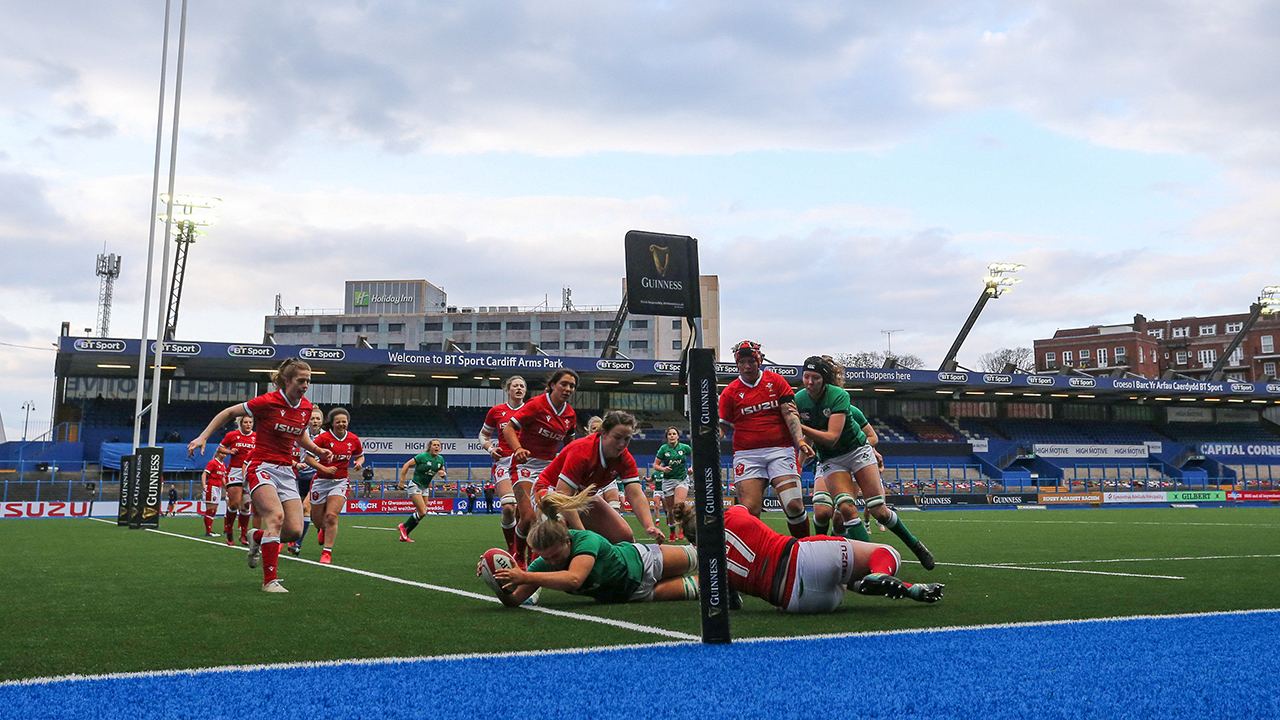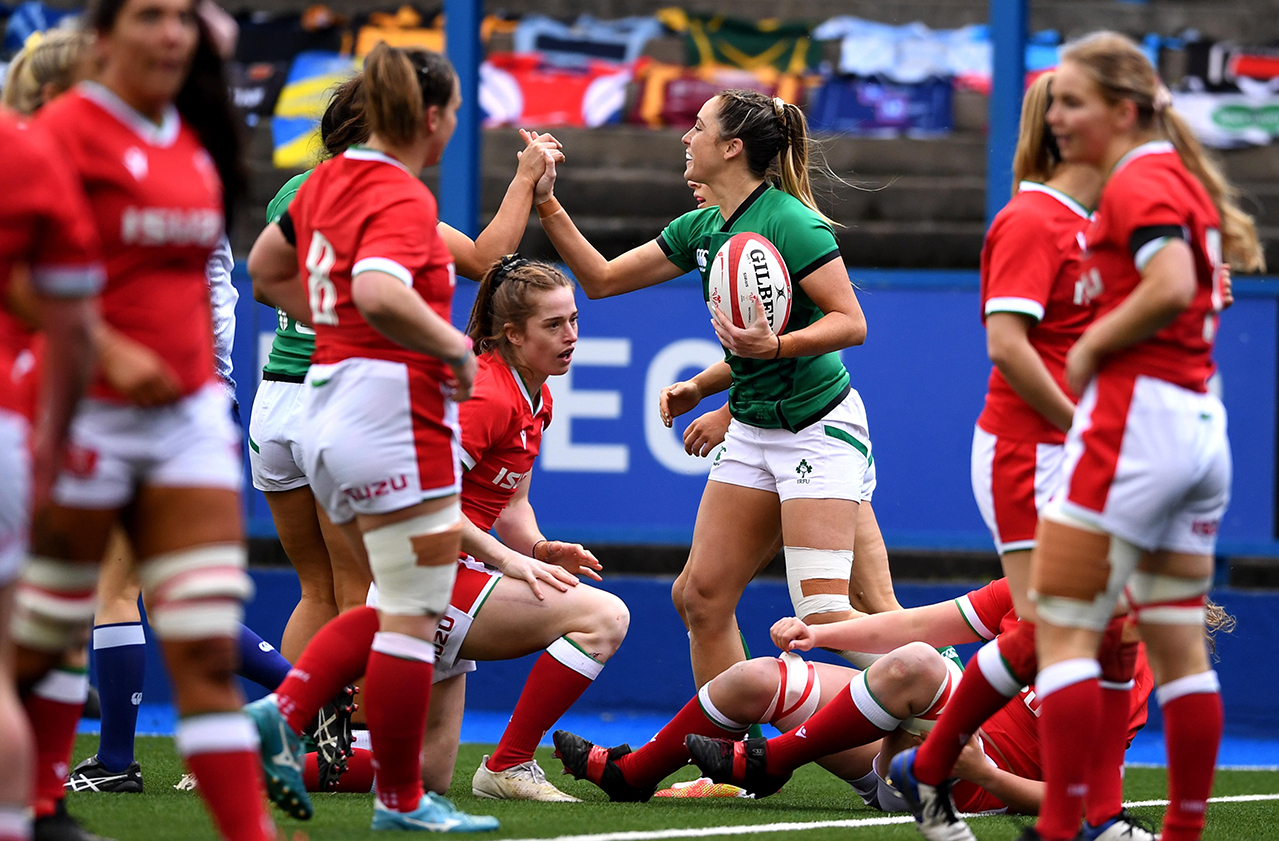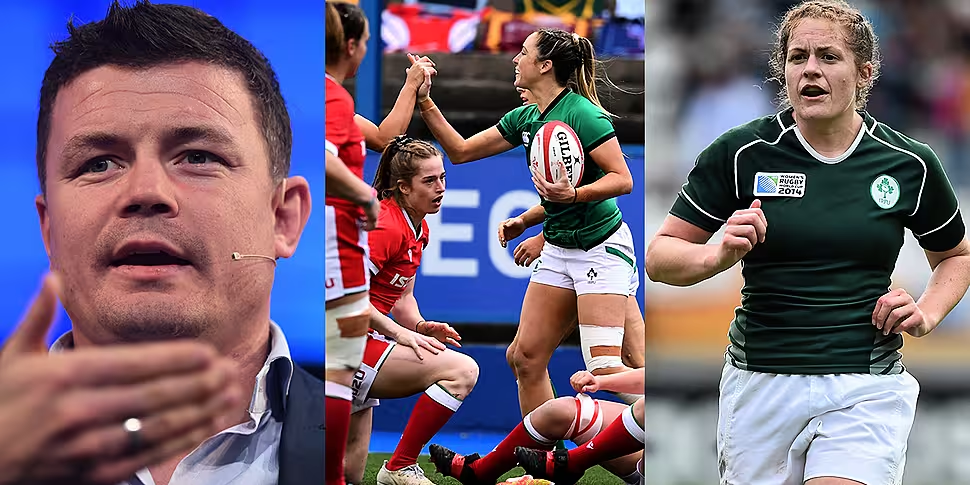Irish legends Brian O’Driscoll and Fiona Coghlan believe that constant visibility is crucial to the growing popularity of women's sport.
As part of their association with the Women’s Six Nations, Guinness uncovered that just 6% of Irish media coverage includes women’s sport.
There is a stark underrepresentation of women’s sport in modern society, which is also represented in the lack of Wikipedia pages for female athletes.
In line with their commitment to promoting the Six Nations this year, Guinness have also partnered with WikiMedia to ensure that every Women’s Six Nations player has a Wikipedia page.
Former Ireland captains O’Driscoll and Coghlan believe that this increased visibility is a great steppingstone to better support.
“In some regards it has been a long time in coming,” O’Driscoll said on the Women’s Six Nations Show on OTB in Association with Guinness.
“I think the important place that we want to get to is normalising the media coverage around women’s sport.
“It has felt that, certainly in my lifetime, that you have to really be extraordinary at an international level, at a real cutting-edge level to get any kudos in Irish media.
“You think about Katie Taylor, you think about Sonia O’Sullivan. If you compare it to men’s, yes, we get that, but you think about all the different levels and layers below that.
“It can be very niche and still get publicity or it could be just the national league and it is still getting publicised.
“We have got to strike a balance.”
O’Driscoll believes that exceptional athletes like Taylor, Rachael Blackmore and now the young Beibhinn Parsons getting their well-deserved coverage will inspire a new generation of young women to pursue sport.
“It is great to have poster-girls for aspiring young athletes and sports people to identify someone; a route to a goal that they want to achieve,” O’Driscoll said.
“That is really important; it is part of the 20x20 campaign, if she can’t see it she can’t be it and it is so true.
“Talking to my daughter about it, she gets inspired by seeing all these different women competing at different sports.
“Something clicks in their brain and they go, ‘well if they are able to do it, well then I am a girl too, why can’t I do it?’
“You just need more repetition, more visibility and eventually we will change the curve.”
 Dorothy Wall of Ireland scores a try during the Women's Six Nations Rugby Championship match between Wales and Ireland at Cardiff Arms Park in Cardiff, Wales. Photo by Chris Fairweather/Sportsfile
Dorothy Wall of Ireland scores a try during the Women's Six Nations Rugby Championship match between Wales and Ireland at Cardiff Arms Park in Cardiff, Wales. Photo by Chris Fairweather/SportsfileInformation about women is vital
While she agreed with O’Driscoll, Coghlan suggested that there needs to be more than just the likes of Blackmore, Taylor and Parsons getting the newspaper column inches.
“I think it is consistency in that coverage,” Coghlan said on Thursday’s show. “It is the others below [the likes of Blackmore and Taylor] that probably aren’t getting any [coverage] because they are not achieving at that top level week in and week out.
“That is where we need to get to; it is the consistency below those world-beaters in order to build the exposure from everyone.”
As a commentator, Coghlan has found that simply getting information on female athletes can be difficult.
“When you are going to profile a team prior to doing commentary, trying to get information is really tough,” Coghlan said.
“[The Wikipedia pages for the Women’s Six Nations players] is a game changer and it is a tangible change that we can see changing immediately.
“It will make a difference for coverage from journalists but also from fan engagement, because they do want to know about these people, they want to know their backgrounds, what they do and where they come from.”
Watch the first episode of our Women’s Six Nations Show on OTB in Association with Guinness here:
For O’Driscoll, the issue of representation crosses into the realm of social media as well as traditional media visibility.
“At the moment, you look at Twitter feeds and Instagram feeds; something which in the past has been very male-dominated,” O’Driscoll said.
“Irish Rugby is a good example. They have tried over the last few years, but not to the degree of what we are seeing at the moment during this Six Nations championship.
“Every other post is women, and while it is women’s time, that is the focus. It feels at the moment that it is unusual that we are getting to see so much of that.
“That is wrong that we are feeling that emotion. [It should be], ‘yeah, of course it is the Women’s Six Nations, of course we are going to be seeing more content, interviews and analysis’.
“It is about getting to that place, and it will take a period of time.”
 Eimear Considine of Ireland celebrates after scoring a try during the Women's Six Nations Rugby Championship match between Wales and Ireland at Cardiff Arms Park in Cardiff, Wales. Photo by Ben Evans/Sportsfile
Eimear Considine of Ireland celebrates after scoring a try during the Women's Six Nations Rugby Championship match between Wales and Ireland at Cardiff Arms Park in Cardiff, Wales. Photo by Ben Evans/SportsfileYou can't please everyone
While there is always going to be an improvement, O’Driscoll knows that you cannot convert everybody.
“You are going to always have the detractors,” O’Driscoll added. “Any time I post something about female sport, I will always have some gobshite sliding into my DMs telling me ‘don’t watch that nonsense’.
“Or, ‘surely you can’t be into that?’, or ‘women don’t even like sport, so why are you putting on women’s sports?’
“Repetition will only allow for those people to be sifted out and to change their opinions.
“Somethings aren’t going to be for everyone, but you don’t want them supporting you either.”
Ireland will face France in their second Women's Six Nations encounter on Saturday at Energia Park in Donnybrook. Kickoff is at 2:15pm, and the match will be aired live on RTE2.
The Women's Six Nations Show on OTB Sports every Thursday is brought to you in association with Guinness, proud partner of Women's Six Nations. Don't miss a moment of the action with LIVE match reports, analysis, reaction, and our in-depth interviews. #NeverSettle. Drink responsibly, visit drinkaware.ie
Download the brand new OffTheBall App in the Play Store & App Store right now! We've got you covered!
Subscribe to OffTheBall's YouTube channel for more videos, like us on Facebook or follow us on Twitter for the latest sporting news and content.








